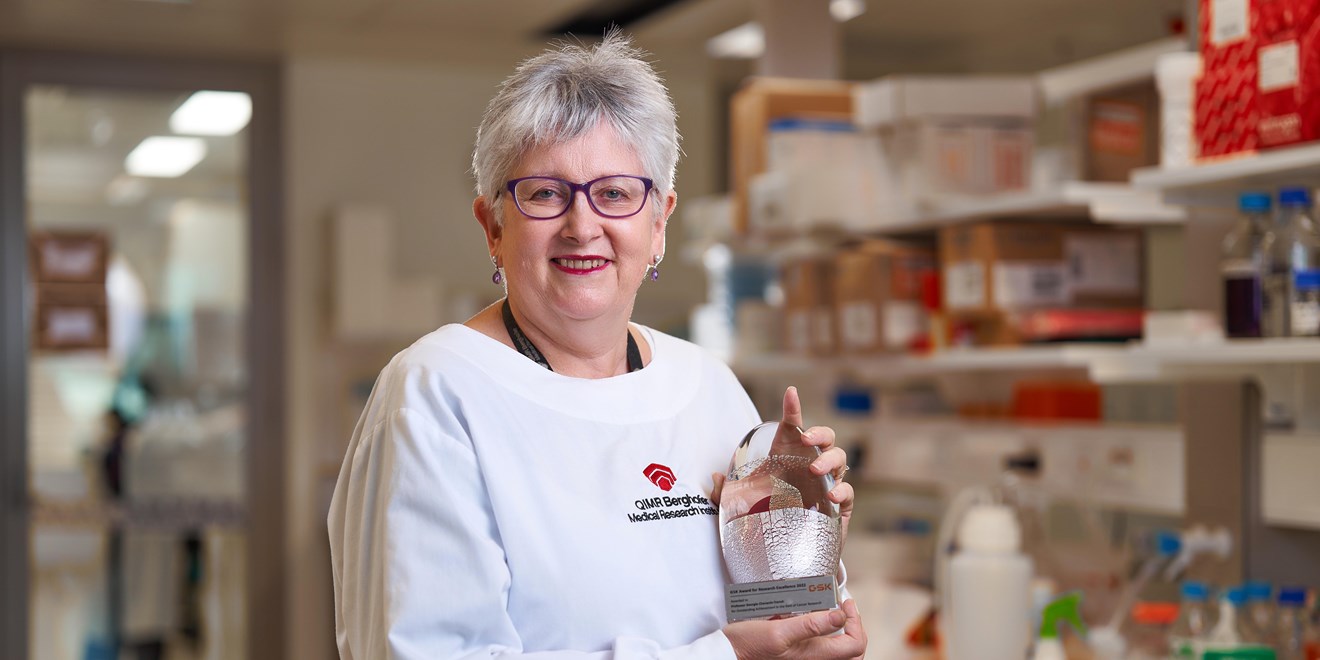Leading Australian scientist at the forefront of genetic breast cancer research wins major industry award
- Professor Georgia Chenevix-Trench becomes the 42nd winner of the GSK Award for Research Excellence 2022.
- This year, Professor Chenevix-Trench was also named one of the most influential health figures in Queensland.
- With over thirty years of experience in cancer genetics, Professor Chenevix-Trench is a world-renowned scientist who is at the forefront of cancer research in Australia.
- With her collaborators, Professor Chenevix-Trench discovered over 240 regions of a genome that are likely to affect a person’s risk of developing breast cancer.
______________________________________________________________________________________
An Australian researcher who is internationally recognised for her work on mapping the genetics of breast, ovarian and other cancers has just been awarded the prestigious 2022 GSK Award for Research Excellence.
Professor Georgia Chenevix-Trench – who is currently a Distinguished Scientist at The QIMR Berghofer Medical Research Institute – has won the 2022 GSK ARE in recognition of her research investigating genetic predispositions to breast and ovarian cancer. Her research has elevated global understanding of why some people have a genetic risk to cancer and what determines it. Her work also has contributed to the development of better screening, possible prevention solutions and treatment options for patients.
Professor Chenevix-Trench says that understanding the biology behind the genomes of cancer cells is key in improving patient outcomes.
“I’ve had an interest in helping those affected by hereditary cancers my entire life,” says Professor Chenevix-Trench. “Over the last five years, my focus has been to understand how genetic variants act as a determining factor in developing breast cancer. Unless we know how these genomes operate in relation to cancerous cells, we won’t be able to translate the knowledge we have gained into tangible treatment options and preventative solutions for patients.”
Breast cancer is the most common cancer affecting Australian women, with approximately 57 people being diagnosed every day in 2022.1 Professor Chenevix-Trench's research has helped the scientific community gain a better understanding of those at risk of the disease.
The genome contains all the essential information needed for a cell to function and develop.2 When abnormal changes occur to the genome of cells in the body, this can trigger the development of cancer. 3
Professor Chenevix-Trench and her team have identified genetic variants in over 240 regions of the genome that can affect a person’s risk of developing breast cancer. As each region consists of a number of genes, the next major challenge for Professor Chenevix-Trench and her team is to identify which of these genes operate in human cancers.
The genetic variants that were discovered are a common occurrence within the general population and differ from the rare mutations previously linked to breast cancer.4 Women who carry these variants are at increased risk of developing breast cancer.2

Professor Chenevix-Trench says the $100,000 AUD grant that comes with the GSK Award for Research Excellence will be used to purchase a new piece of equipment that enables real-time cell analysis.
“We’re currently undertaking research that looks at how certain genes influence the way cancerous cells or tumours are destroyed by the immune system. This is very exciting work. By gaining access to the new instrument, we will be able to accelerate our work and expand our insights into the behaviour of cancerous cells,” says Professor Chenevix-Trench.
The 2022 GSK Award for Research Excellence (ARE) was presented to Professor Chenevix-Trench at Research Australia’s Health and Medical Research Awards 2022 in Melbourne. Dr Alan Paul, Medical Director at GSK Australia, said GSK is proud to be able to continue supporting home-grown Australian research through the award.
"We are thrilled to welcome Professor Georgia Chenevix-Trench to our esteemed list of the GSK ARE winners, in recognition of her outstanding contributions to the health of Australians,” said Dr Alan Paul. “Georgia, and her team, are driving innovative research in cancer genetics that truly has the potential to improve health outcomes for cancer patients around the world.”
Professor Chenevix-Trench says she is delighted to be named the 2022 winner of the GSK Award for Research Excellence.
“I am looking forward to joining the legacy of this award and using my role as a leader in this industry to champion and support other female scientists in Australia,” says Professor Chenevix-Trench
The GSK Award for Research Excellence is one of the most prestigious and longstanding independently-judged awards available to the Australian medical research community. It has been awarded since 1980 to recognise outstanding achievements in medical research with a focus on human health. Over the course of the last 42 years, over $3 million* has been awarded to support Australian research and innovation.
Among the previous recipients of the GSK Award for Research Excellence are some of Australia’s most noted scientific researchers, including Professor Mark Febbraio (2020), Professor Brendan Crabb (2019), and Professor Kathryn North (2011). The 2021 GSK Award for Research Excellence was awarded to Professor Jamie Cooper AO and Professor Rinaldo Bellomo AO, Co-Directors of the Australian and New Zealand Intensive Care Research Centre, for their innovative research and leadership that has revolutionised critical care medicine globally.
ENDS
Media enquiries:
Anastasiia Nazarenko (Palin Communications) +61 435 977 559
Courtney Walkinshaw (GSK) +64 21 529 795
About GSK
GSK is a science-led global healthcare company. For further information please visit www.gsk.com/about-us
References
- Breast Cancer Network Australia. 2022. Understanding breast cancer. Available at: https://www.bcna.org.au/understanding-breast-cancer/
- National Human Genome Research Institute. About Genomics. Updated 10 May 2022. Available at https://www.genome.gov/genetics-glossary/Genome
- Stratton, M., Campbell, P. & Futreal, P. The cancer genome. Nature 458, 719–724 (2009). https://doi.org/10.1038/nature07943
- Fachal, L. et al. 2020. Fine-mapping of 150 breast cancer risk regions identifies 191 likely target genes. Nature Genetics, 52(1), pp. 56–73. Available at: https://doi.org/10.1038/s41588-019-0537-1.
* 2022 value calculated from the respective yearly grants by adjusting for inflation.
